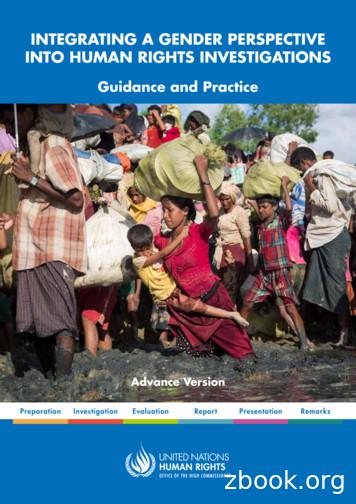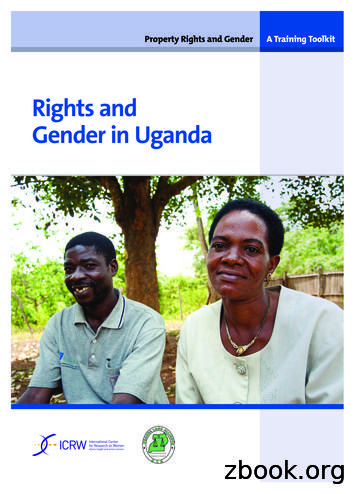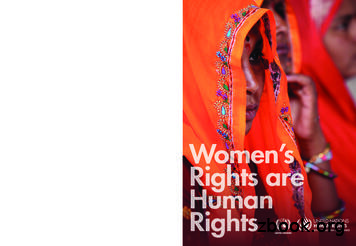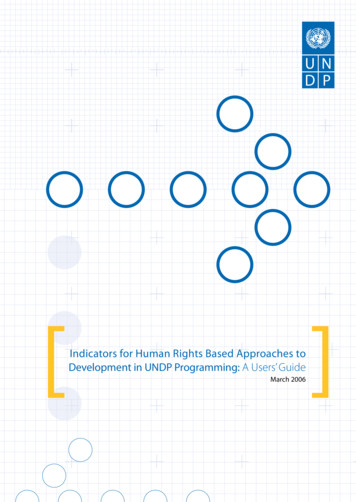Human Rights And Gender
Human Rights and Gender PoliticsIn recent years, the slogan ‘women’s rights are human rights’ has become acentral claim of the global women’s movement. Human Rights and GenderPolitics examines the critical issues raised by this embracing and expansion ofthe human rights discourse by feminists world-wide.Through detailed case studies drawn from the Asia-Pacific region, this bookexplores the tensions between an apparently universalizing discourse of humanrights and increasing awareness of the complexities of women’s politics ofdifference. It questions how feminists negotiate controversial issues such as‘rights’ and ‘cultural relativism’, and argues for an increased focus on the waysin which human rights claims are embedded in highly specific local contexts,histories and struggles. This original and thorough volume assembles anoutstanding panel of international experts who address diverse issues including: enforced military prostitution during the Second World Warthe question of women’s rights within the Indian feminist movementthe politics of China’s one-child policywomen’s struggles against domestic violenceambivalence towards feminism among Salvadoran activists in Australiathe growth of lesbian and gay movements throughout the Asia-Pacific.This volume challenges conventional, un-gendered and male-centred analyses ofthe politics of human rights and addresses the future of global feminisms. It isessential reading for all those interested in learning more about human rights andwomen’s rights in the Asia-Pacific region.Anne-Marie Hilsdon is Senior Lecturer in Anthropology and Sociology andVera Mackie is Foundation Professor of Japanese Studies, at Curtin University,Australia. Martha Macintyre is Senior Lecturer in Medical Anthropology andMaila Stivens is Director of Women’s Studies, both based at the University ofMelbourne, Australia.
Routledge Advances in Asia-Pacific Studies1 Environment, Education and Society in the Asia-PacificLocal traditions and global discoursesEdited by David Yencken, John Fien and Helen Sykes2 Ageing in the Asia-Pacific RegionDavid R.Phillips3 Caring for or the Elderly in Japan and the USPractices and policiesSusan Orpett Long4 Human Rights and Gender PoliticsAsia-Pacific perspectivesEdited by Anne-Marie Hilsdon, Martha Macintyre, Vera Mackie andMaila Stivens
Human Rights and GenderPoliticsAsia-Pacific perspectivesEdited byAnne-Marie Hilsdon,Martha Macintyre, Vera Mackieand Maila StivensLondon and New York
First published 2000by Routledge11 New Fetter Lane, London EC4P 4EESimultaneously published in the USA and Canadaby Routledge29 West 35th Street, New York, NY 10001Routledge is an imprint of the Taylor & Francis GroupThis edition published in the Taylor & Francis e-Library, 2005.“To purchase your own copy of this or any of Taylor & Francis or Routledge’s collectionof thousands of eBooks please go to www.eBookstore.tandf.co.uk.” 2000 Anne-Marie Hilsdon, Martha Macintyre, Vera Mackie and Maila Stivens,selection and editorial matter; individual chapters, the contributors.All rights reserved. No part of this book may be reprinted or reproduced or utilized in anyform or by any electronic, mechanical, or other means, now known or hereafter invented,including photocopying and recording, or in any information storage or retrieval system,without permission in writing from the publishers.British Library Cataloguing in Publication DataA catalogue record for this book is availablefrom the British Library.Library of Congress Cataloging in Publication DataHuman rights and gender politics: Asia-Pacific perspectives/edited by Anne-Marie Hilsdon, Martha Macintyre, Vera Mackie and Maila Stivens 256 p15.6 23.4 cm—(Routledge advances in Asia-Pacific studies 5) Includes bibliographicalreferences and index1. Human rights—Asia. 2. Human rights—Pacific Area. 3.Women’s rights—Asia. 4. Women’s rights—Pacific Area. 5.Women—Asia—Social conditions. 6. Women—Pacific Area—Social conditions. I. Hilsdon, Anne-Marie, Macintyre, Martha,Mackie, Vera and Stivens, Maila. II. Series.JC 599.A78 H8256 2000323.3’4–dc21 99–059821ISBN 0-203-64541-3 Master e-book ISBNISBN 0-203-67435-9 (Adobe eReader Format)ISBN 0-415-19173-4 (hbk)
ContentsNotes on contributorsviiAcknowledgementsx1Introduction: gender politics and the reimagining of human rightsin the Asia-PacificMAILA STIVENS12Sexual violence, silence, and human rights discourse: theemergence of the military prostitution issueVERA MACKIE373The state and the women’s movement: instabilities in thediscourse of ‘rights’ in IndiaKALPANA RAM594Dead daughters, dissident sons, and human rights in ChinaANTONIA FINNANE815The human rights of gendered citizens: notes from IndonesiaKRISHNA SEN1046Woman ikat raet long human raet o no?: women’s rights, humanrights, and domestic violence in VanuatuMARGARET JOLLY1207‘Hear us, women of Papua New Guinea!’: Melanesian women andhuman rightsMARTHA MACINTYRE1438The Contemplacion fiasco: the hanging of a Filipino domesticworker in SingaporeANNE-MARIE HILSDON1679Mothers of the disappeared in the diaspora: globalization andhuman rightsBERYL LANGER188
vi10The emergence of ‘modern’ gay identities and the question ofhuman rights205DENNIS ALTMANIndex222
ContributorsDennis Altman is Professor of Politics at La Trobe University and the authorof nine books including Defying Gravity (Allen and Unwin 1997) and Powerand Community: Organizational and Cultural Responses to AIDS (Taylor andFrancis 1994). He has served on a number of national and international AIDSbodies and is now researching AIDS and global governance.Antonia Finnane is Senior Lecturer in the Department of History, Universityof Melbourne. Her research has included extensive work on the history ofYangzhou in the late imperial period and most recently a project on twentiethcentury Chinese political culture through the prism of dress. Her publicationsinclude Far from Where? Jewish Immigrants from Shanghai to Australia(Melbourne University Press 1998), and a volume co-edited with AnneMcLaren, Dress, Sex and Text in Chinese Culture (Monash Asia Institute1999).Anne-Marie Hilsdon is Senior Lecturer in the School of Social Sciences atCurtin University of Technology in Western Australia, where she teachesgender studies and Southeast Asian studies. She has been researching in thePhilippines for ten years on various topics including gender, militarism, labourmigration and Islam. Her main publication is the book Madonnas andMartyrs: Militarism and Violence in the Philippines (Allen and Unwin 1995).Margaret Jolly is Senior Fellow and Convenor of the Gender RelationsProject in the Research School of Pacific and Asian Studies, AustralianNational University, having previously taught in Macquarie University. Herpublications on women in the Pacific and Vanuatu, on the Cook voyages, ongender in colonial history and on the politics of tradition include Women of thePlace: Kastom, Colonialism and Gender in Vanuatu (Harwood 1994), Familyand Gender in the Pacific: Domestic Contradictions and the Colonial Impact(co-edited with Martha Macintyre, Cambridge University Press 1989), Sites ofDesire/Economies of Pleasure (co-edited with Lenore Manderson, Chicago1997) and Maternities and Modernities: Colonial and PostcolonialExperiences in the Asia Pacific Region (co-edited with Kalpana Ram,Cambridge University Press 1998).
viiiBeryl Langer is Senior Lecturer in Sociology, La Trobe University. Herpublications on issues of Salvadoran migrant women’s experiences and on thesociology of childhood include ‘Born to Shop: Children and ConsumerCapitalism’, in F.Briggs (ed.), Families and Children (Allen and Unwin1994), and ‘Globalisation and the Myth of Ethnic Community: SalvadoranRefugees and the Multicultural State’, in D.Bennett (ed.), Multicultural States:Rethinking Difference and Identity (Routledge 1998).Martha Macintyre is Senior Lecturer in Medical Anthropology at theUniversity of Melbourne. She has conducted research into gender anddevelopment in Papua New Guinea for almost twenty years, most recently intothe social impact of mining in Papua New Guinea and into immigrantwomen’s health in Australia. Her main publications include The Kula: ABibliography (Cambridge University Press 1983), Shifting Latitudes,Changing Attitudes: A Study of Migrant Women’s Health (with LorraineDennerstein, Melbourne University Press 1995), and a jointly edited volumewith Margaret Jolly, Family and Gender in the Pacific: DomesticContradictions and the Colonial Impact (Cambridge 1989).Vera Mackie is Foundation Professor of Japanese Studies at Curtin Universityof Technology in Western Australia, and taught modern Japanese history andwomen’s studies at the University of Melbourne for several years. She haspublished widely on gender, citizenship and politics in modern Japan,including her monograph Creating Socialist Women in Japan: Gender,Labour and Activism 1900–1937 (Cambridge University Press 1997).Kalpana Ram is an Australian Research Council Research Fellow in theDepartment of Anthropology, Macquarie University, having previously taughtat Macquarie and been a Research Fellow in the Gender Relations Project inthe Australian National University. Her publications include MukkuvarWomen (Allen and Unwin 1991), Maternities and Modernities: Colonial andPostcolonial Experiences in the Asia Pacific Region (Cambridge UniversityPress 1998, co-edited with Margaret Jolly), and a number of papers on genderand feminist theory. She is currently working on dance, nationalism in Indiaand in the Indian diaspora, and modernity and female embodiment in rural southIndia.Krishna Sen is Associate Professor in the School of Media and Information atCurtin University of Technology in Western Australia. She is the author ofIndonesian Cinema: Framing the New Order (Zed 1994), and co-editor, withMaila Stivens, of Gender and Power in Affluent Asia (Routledge 1998). Herresearch on Indonesian media, drawing on feminist perspectives, has beenpublished extensively in edited volumes and journals.Maila Stivens is Director of Women’s Studies at the University ofMelbourne, having previously taught anthropology at University College,London. She has researched into middle-class kinship in Sydney, gender andunderdevelopment in Malaysia, and gender, modernity and the new middle
ixclasses in Malaysia. Her main publications include Why Gender Matters inSoutheast Asian Politics (editor, Monash Centre of Southeast Asian Studies1991), Malay Peasant Women and the Land (with Jomo Sundaram and CeciliaNg, Zed 1994), Matriliny and Modernity: Sexual Politics and Social Changein Rural Malaysia (Allen and Unwin 1996), and Gender and Power inAffluent Asia (jointly edited with Krishna Sen, Routledge 1998).
AcknowledgementsThe poetry of Betty Arthur, Agnes Dewenis, Helen Hakena, Lucy Passigan andLucy Sinei is reproduced in Chapter 7 by kind permission of the Leitana NehanWomen’s Development Agency, Papua New Guinea. The poem Civilized Girl isreproduced by kind permission of Jully Makini (Sipolo).
1IntroductionGender politics and the reimagining of human rights inthe Asia-PacificMaila StivensAs the new millennium leaves behind the most violent of centuries, human rightsactivists and international agencies are looking to a new Age of Rights.Feminists have been prominent among those struggling ‘from below’ toreconstruct human rights: the slogan ‘women’s rights are human rights’ hasbecome a central claim of the global women’s movement; feminist theorists haveargued for an explicit inclusion of women and gender in human rights tenets; andUnited Nations forums have become central sites of an energetic new globalfeminist ‘public’, providing unprecedented avenues for feminist initiatives andaction. It is clear, however, that feminist reshapings of human rights have beenengaged in complex conversations with both human rights claims and withfeminist and gender politics in all their many local versions.The contributors to this volume address these complex conversations througha number of case studies within the Asia-Pacific region.1 We were excited byattempts to expand the human rights project to include women’s rights and otherissues concerning gender and sexuality which intersect with feminist politics.The 1993 Vienna Human Rights Conference and the 1995 Beijing Women’sConference saw a dramatic increase in the deployment of human rights discourseby feminists worldwide. Activists and critical legal theorists sought ‘to transformthe assumptions, discourse and goals of the international human rightsmovement and by implication, the power structures of states and internationalorganizations’ (Bouvard 1996:xii). It was argued both that human rights law andpractice had systematically excluded the experiences of women and thatwomen’s rights were to be understood as human rights. The core of this critiquepoints to the inherent masculinism of much thinking about international humanrights. Essentially, it was held, man had been the measure and the standard forestablishing appropriate, fair and reasonable behaviour (Kaufman and Lindquist1995:121).We also felt, however, that the growth of the global ‘women’s human rightsproject’ posed a series of critical issues for feminists and human rights activistsin the region and beyond. How and why did this space for gender politics openup? Why have feminists at this point been homing in on human rights discourseas a pre-eminent global space for feminist politics? Why now? What are theconsequences of the development of this space? And what happens to both the
2 MAILA STIVENSfeminist and human rights projects when feminists adopt the concept of ‘humanrights’ as the core claim of a global feminist politics? As I argue, the feministexpansion of the human rights project has meant that many women’s movementconcerns of the last three decades have been recast as human rights issues (as inTomasevski’s 1993 volume). Dennis Altman argues in his contribution to thisvolume (Chapter 10) that there has been a similar appropriation of human rightsdiscourse by lesbian and gay rights activists. Others have also joined this humanrights push, including advocates of children’s rights, indigenous rights, landrights and disability rights. Why are so many feminists keen to claim a placealongside these projects?This poses a related question: why are we seeing a return to an apparentlyuniversalizing discourse of human rights, just when many feminist intellectualsand activists alike had become acutely aware of the complexities of women’spolitics of difference? How do we resolve the tensions between a gender politicsincreasingly located within the ‘women’s-rights-are-human-rights’ frame and thepost-modern and post-colonial uncertainties and fragmentations thatcontemporary feminisms have so strongly acknowledged? Are we seeing a shiftwithin feminist discourse away from a post-modern neo-romanticism, overlyconcerned with culture, text and meaning (Benhabib 1992; Ebert 1996)? And ifso, how should we understand that shift? Is the women’s rights/human rightsproject to be seen as a convenient way to sidestep some of the difficult issuesraised by ‘third-world’ women and others challenging a single feminist voice,albeit within the new conjunctures posed by globalization? Or can it be seen aspart of attempts to move beyond simplistic dichotomies between ‘post-modern’and ‘universalist’ (Fraser 1997)? This would place it within the recent quests forreconstituted ‘universals’ within feminisms and other social movements that somerecent writers have termed ‘transversals’, as I discuss in more detail below(Yuval-Davis 1997).Some of our principal questions are resolved in a core argument of the volumewhich looks at the polarities within human rights debates between universalismand particularism and cultural relativism. These polarities can be transcended, wepropose, by looking at the ways in which claims to rights are embedded in highlyspecific local contexts and struggles. The anthropologist Richard Wilsoncomments:As with most absolutist dualisms, the universalist/relativist polarity is toototalising in its conceptualisation. The intellectual efforts of those seekingto develop a framework for understanding the social life of rights would bebetter directed not towards foreclosing their onto-logical status, but insteadby exploring their meaning and use. What are needed [sic] are moredetailed studies of human rights according to the actions and intents ofsocial actors, within wider historical constraints of institutionalised power.(Wilson 1997:3–4)
INTRODUCTION3As Wilson suggests, it is possible to have contextualization without relativization(1997:12). We argue that many human rights claims are not to be understood assimply universalizing ‘imports’ from western liberalism and radicalism. Nor arethey simply neo-colonial imposts, as both political opponents of human rightsactivists and some post-colonial theorists hold.2 Rather, recent claims about‘women’s rights as human rights’ in the region are better understood as highlyspecific products of local social movements. These movements have arisen in thecontext of multiple, divergent modernities within a globalizing regional andworld order. The local forms of modernity, which differ from western versions,have inevitably generated their own forms of struggle, including feminist,womanist and other gender-based struggles. As we argue, those involved in suchstruggles are drawing on long-circulating, quintessentially ‘modern’ ideas aboutdemocracy, rights, equality and justice. Such ideas have formed part of theconstitution of their social orders no less than those of modernity in the West.Today, we propose, these ideas are being reclaimed and reimagined in an oftenexuberant transforming of the notion of ‘rights’ within a new world order of‘global modernities’ (Featherstone and Lash 1995:3). The case studies in thisvolume explore the many and intricate ways in which human rights discoursesand action have emerged, been reworked and negotiated within specificinstitutional contexts and in a direct relationship to the larger globalizing order.This approach, we suggest, can allow us to move beyond the prevailing polaritiesof the debates without succumbing to relativism or simplistic culturalism.The Asia-Pacific focus of the volume throws the tensions betweenuniversalism and cultural relativism into especial relief. Developments within thePacific Rim suggest novel perspectives from which to debate both thecomplexities of human rights claims and the future of feminisms. A perspectivedrawing on recent Asian developments, in particular, cuts across the grain ofmany of the Euro-American debates about human rights and democracy,undermining notions drawn from the European historical experience aboutliberal modernity and its accompanying political forms. While the Pacific hassuffered the classic problems of ‘third-world’ underdevelopment, parts of Eastand Southeast Asia until the 1997 financial collapse saw many of the region’spoliticos triumphantly proclaiming the success of ‘Asian values’ in producingalternate modernities. Local intellectuals, subalterns and other activists disputedthe costs of such ‘development’, especially the authoritarian state managerialismof many regimes.3 But many also entertained some degree of optimism about thepossibilities for democratic reform resulting from such growth. The implodingfinancial chaos of a number of countries radically altered some of thesepredictions, intensifying human rights issues dramatically: this is especially thecase in Indonesia, where widespread state abuse of human rights is alleged in thewake of social unrest. But those same destabilizing forces have also seen aresurgence of democracy movements within Indonesia and Malaysia, in whichhuman rights demands have become core elements of new political movements.
4 MAILA STIVENSThe contributors to this volume are anthropologists, sociolo
Human Rights and Gender Politics In recent years, the slogan ‘women’s rights are human rights’ has become a central claim of the global women’s movement. Human Rights and Gender Politics examines the critical issues raised by this embra
Gender analysis is an integral part of a human rights-based approach1, allowing one to see the many ways that gender affects human rights. As a starting point for gender integration, it can propose measures that will close the gender gap between international human rights standards and the everyday human rights situation on the ground.File Size: 679KB
Rights and gendeR in Uganda · 3 Rights & Human Rights Background Rights The law is based on the notion of rights. Community rights workers need to understand what rights are, where rights come from, and their own role in protecting and promoting rights. Community rights worker
accessible and diverse gender information. It is one of a family of knowledge services based at IDS . Other recent publications in the Cutting Edge Pack series: Gender and Care, 2009 Gender and Indicators, 2007 Gender and Sexuality, 2007 Gender and Trade, 2006 Gender and Migration, 2005 Gender and ICTs, 2004 . 6.3.1 Gender mainstreaming .
keywords: gender identity bill - gender identity - gender discrimination – equality - human rights - european union law - national law. malta’s gender identity, gender expression and sex characteristics act – a shift from a binary gender to a whole new spectrum?
A Human Rights Perspective by David Shiman Raising Children with Roots, Rights and Responsibilities: Celebrating the UN Convention on the Rights of the Child by Lori DuPont, Joanne Foley, and Annette Gagliardi Lesbian, Gay, Bisexual, and Transgender Rights: A Human Rights Perspective by David M. Donahue The Human Rights Education Handbook:
make up the International Bill of Human Rights. The provisions of the two Covenants, as well as other human rights treaties, are legally binding on . of their human rights, for example marriage and the family. 6 WOMEN’S RiGHTS ARE HUMAN RiGHTS The Convention defines d
stream human rights into development projects and to monitor and implement a human rights-based approach (HRBA) to development more generally. From the side of human rights, the demand has come from recognition among the human rights treaty monitoring bodies, the Office of the High Commissioner for Human Rights, and a variety of Special .
and artificial intelligence (AI) — combined with various analytics approaches and tools — can help CFOs move forwards on this path and ultimately transform the entire finance function. According to PwC’s Finance Effectiveness Benchmarking Report 2019, 61% of finance leaders believe that finance functions could become more effective with improved technology.1 In fact, CFOs are uniquely .























